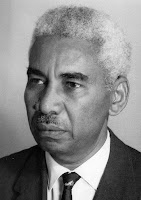إبراهيم محمد المغربي (رائد جراحة العظام والطب الرياضي والمايستوما)
 |
| Ibrahim Mohamed El Moghrabi |
Mr. IM El-Moghrabi (1913-1993), DKSM, D Chir., D Orth.,
FRCS, FICS, PhD (Hon) had his secondary education at Gordon’s Memorial College,
Khartoum, and joined Kitchener School of Medicine and qualified at the age of
21 in 1935. He was top of his class throughout his school career and won the
Anatomy and Physiology prizes in 1932. He passed his final examinations with
distinction and won the Waterfield prize in Surgery and the school prize in
Medicine.
He joined the Sudan Medical Service (SMS) and after
finishing his house jobs at Khartoum Civil Hospital, he was posted to several
districts of Sudan. As a Medical Inspector in Wadi Halfa, he conducted the
Gambia Mosquito Campaign and fought a Typhus epidemic.
In 1939, Dr. Moghrabi was chosen as the first Sudanese
Surgical Registrar and was trained by the late Mr. T.S. Mayne.[i] In
1946-1949, he left to Egypt on his own and attended postgraduate courses in
Kasr El Aini Medical School, King Fouad 1 University, Cairo. He obtained a
Diploma in General Surgery and a Diploma in Orthopaedic Surgery. He then
trained at his own expense in UK for the Surgical Fellowship at Guy’s, St.
Mark’s, the National Orthopaedic and the Marsden Hospitals, and the Institute
of Urology, London.
In 1952, he became the first Sudanese and the first graduate
of KSM to obtain the English Fellowship. He took part in research projects on
Metabolic Response to Trauma, and Fluid Balance in Prostatectomy Patients at
the Royal Infirmary, Liverpool, under Professor Charles Wells. On return to Sudan
in 1953, he was posted to Wad Medani to become the first Sudanese Consultant
Surgeon to take over the Blue Nile Province from the British.
He rapidly developed the Wad Medani Hospital and made it the
leading surgical centre of Sudan. Under his leadership, it gained the
recognition of the Royal Colleges for training for the final Fellowship
examinations. He himself gained nation-wide fame for the treatment of football
injuries and was the pioneer of modern orthopaedic surgery. He wrote
extensively on the surgical diseases of Sudan and became an authority in the
surgery of massive Pyloro-duodenal Fibrosis (Syn. Shaigi Syndrome), Bilharziasis
and Portal Hypertension in Sudan. He also conducted important research on
Mycetoma (Madura foot) in collaboration with the London School of Tropical
Medicine and Hygiene. The research was supported by a grant from the MRC (UK).
In 1965, he was transferred to Khartoum as Senior Surgeon to
the Ministry of Health. A post he held until his retirement in 1969. He was
succeeded by Mr. Ahmed Abdel Aziz Yacoub.
Among other achievements as Senior Surgeon, he championed
the cause of the Omdurman Military Hospital until it gained recognition for the
final Fellowship training in general surgery and ophthalmology by the Royal
College. He then devoted his time to teaching both under and post-graduate
students in surgery, anatomy, and pathology. He was an examiner in anatomy,
pathology and surgery for the MB Diploma and the local Masters in Surgery (MS),
Khartoum University.
He was instrumental in the compilation and production of the
first issue of the Sudan National Formulary. He was the President of the Sudan
Association of Surgeons for two terms of office. He was a founder member and
first president of the Sudan Section of the International College of Surgeons
(Chicago) in 1972. He was awarded a honourary PhD from the Gezira University in
1989.
He founded El Nilein Trading Agencies for the import of
pharmaceuticals and surgical instruments and equipment. He also had notable
activities and contributions outside the medical field. He was the chairperson
and member of the board of directors of some of the leading companies of the
Sudan (The General Insurance Company, Sudan Plastics, the Nile Cement Company,
National Footwear etc. …).
[i] FS Mayne obtained his medical degrees at Queens University, Belfast,
and FRCSE. He was posted to Sennar in place of O’Shaughnessy on his retirement
in 1929. He had had considerable surgical experience when he succeeded
Grantham-Hill in Khartoum in 1933. He continued as Senior Surgeon and Lecturer
in Surgery until 1944 when he was forced to retire due to illness. (Squires,
Herbert Chavasse. The Sudan London
Comments